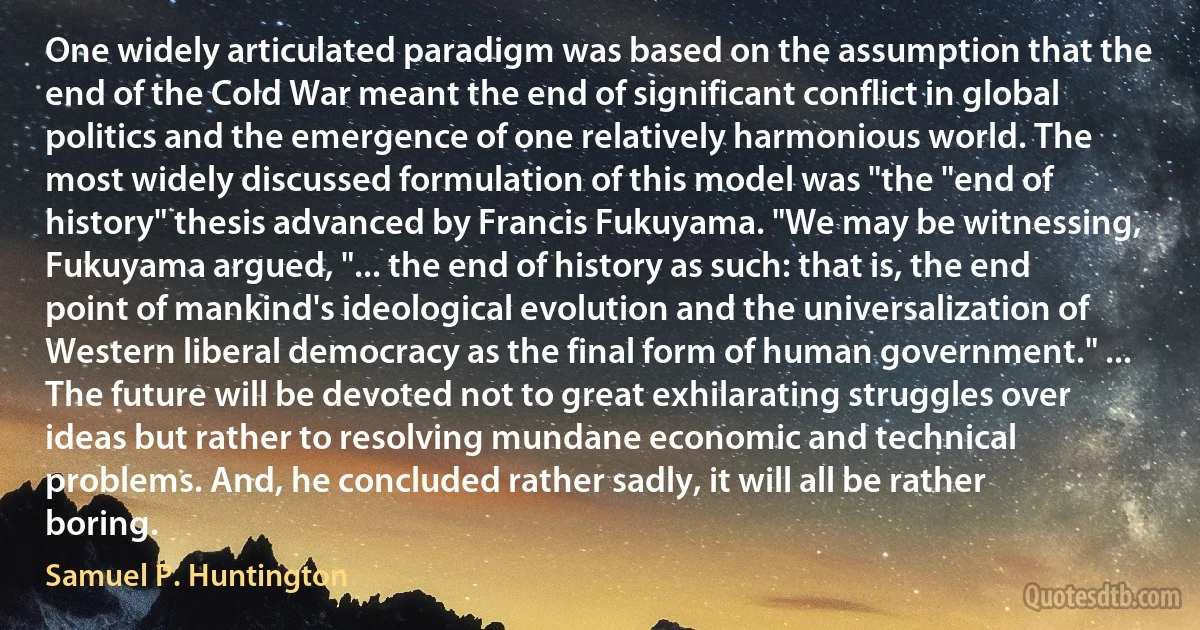
One widely articulated paradigm was based on the assumption that the end of the Cold War meant the end of significant conflict in global politics and the emergence of one relatively harmonious world. The most widely discussed formulation of this model was "the "end of history" thesis advanced by Francis Fukuyama. "We may be witnessing, Fukuyama argued, "... the end of history as such: that is, the end point of mankind's ideological evolution and the universalization of Western liberal democracy as the final form of human government." ... The future will be devoted not to great exhilarating struggles over ideas but rather to resolving mundane economic and technical problems. And, he concluded rather sadly, it will all be rather boring.
Samuel P. HuntingtonRelated topics
articulated assumption cold emergence end evolution final form formulation future government great history human mean model mundane paradigm point politics resolving significant technical thesis war western witnessing world globalRelated quotes
But having invited them here, having accepted their great and varied contributions to the building of the Nation, it is for us to maintain in all good faith those liberal institutions and traditions which have been so productive of good. The bringing together of all these different national, racial, religious, and cultural elements has made our country a kind of composite of the rest of the world, and we can render no greater service than by demonstrating the possibility of harmonious cooperation among so many various groups. Every one of them has something characteristic and significant of great value to cast into the common fund of our material, intellectual, and spiritual resources.

Calvin Coolidge
Anyone familiar with my work knows that I am extremely critical of all religious faiths. I have argued elsewhere that the ascendancy of Christian conservatism in American politics should terrify and embarrass us. And yet, there are gradations to the evil that is done in name of God, and these gradations must be honestly observed. So let us now make sense of the impossible by acknowledging the obvious: there is a direct link between the doctrine of Islam and Muslim terrorism. Acknowledging this link remains especially taboo among political liberals..... While the other major world religions have been fertile sources of intolerance, it is clear that the doctrine of Islam poses unique problems for the emergence of a global civilization.

Sam Harris
I don't oppose all wars. What I am opposed to is a dumb war. What I am opposed to is a rash war. What I am opposed to is the cynical attempt by Richard Perle and Paul Wolfowitz and other armchair, weekend warriors in this administration to shove their own ideological agendas down our throats, irrespective of the costs in lives lost and in hardships borne. What I am opposed to is the attempt by political hacks like Karl Rove to distract us from a rise in the uninsured, a rise in the poverty rate, a drop in the median income, to distract us from corporate scandals and a stock market that has just gone through the worst month since the Great Depression. That's what I'm opposed to. A dumb war. A rash war. A war based not on reason but on passion, not on principle but on politics.

Karl Rove
We have strong economic relationships with the rest of the UK. With our EU partners. And with large and small nations across the world. And I would contend that the basis of that framework is not Scotland's relationship with the other nations of the UK - strong and enduring though that will be. Rather, the reality is that our fundamental economic role is as a member of the world's largest single market - the European Union. And it is this relationship which does most to shape the rules and the terms of our global commercial ties. Nonetheless it remains for many an article of faith that a positive future for Scotland's economy depends squarely on our continuing membership of the United Kingdom. ... I for one was not convinced!

Alex Salmond
The belief that we can maintain current levels of consumption, especially of animal products, capitalist expansion, imperial wars, a reliance on fossil fuels and abject subservience to unfettered corporate power, which has solidified the worst income inequality in human history, is not a form of hope but suicidal self-delusion. We are not headed under the policies of the Biden administration and the global ruling elite for the broad sunlit uplands of a new and glorious future, but economic misery, vast climate migrations, waves of new and more virulent pandemics, of which COVID-19 is a mild precursor, along with irreversible ecological systems collapse and frightening forms of societal breakdown, authoritarianism and neofascism.

Chris Hedges
